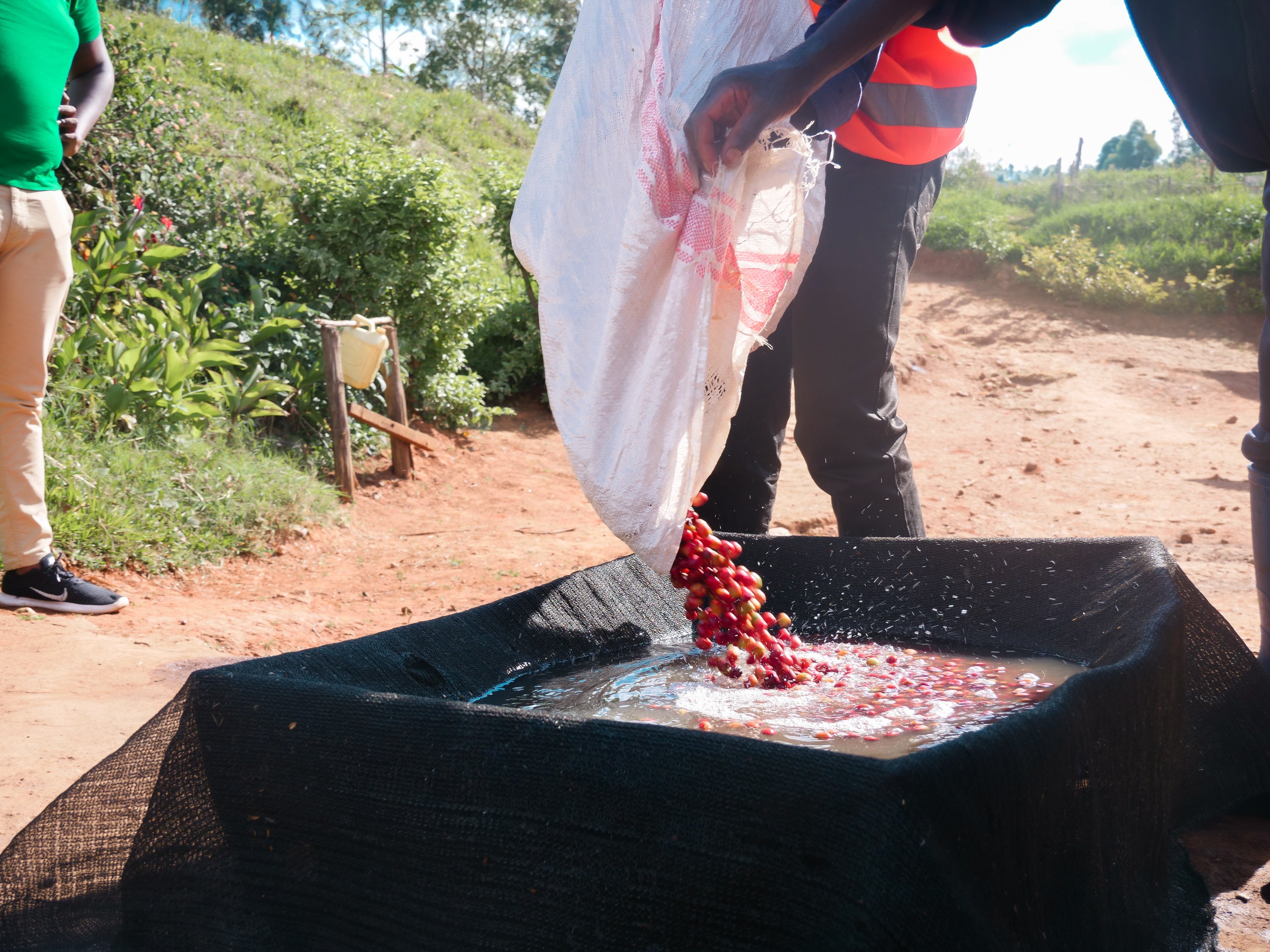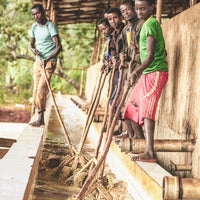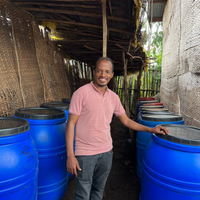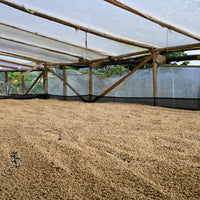Origin: Burundi
Region: Kayanza
Washing Station: Nemba
Altitude: 1700 meters above sea level
Variety: Red Bourbon
Process: 48hr Yeast Inoculated (Oro) Natural
Tasting Notes: Big and funky with notes of snakes, red frogs and green frogs.
There are 3,113 smallholders living around Kayanza, Burundi who deliver their cherry to Nemba Washing Station. We are excited to import this coffee from our in-country partner Greenco. In addition to operating 13 washing stations in Burundi and processing excellent coffee, Greenco is also working with communities to increase farmer livelihoods and general equality in coffee producing areas.
Nemba station lies in the northern province of Kayanza. Each washing station is managed and lead by an agronomist. This agronomist oversees the implementation of Good Agricultural Practices (GAPs) and farmer education. They collaborate with the producers to ensure they have access to the necessary farming tools. The agronomist also helps farmers determine and implement the practices best suited to the specific growing conditions of their farming plots.
Nemba uses a monitoring system to ensure traceability all along the production and processing chain. All 3,000+ producers are smallholders who own an average of 150 coffee trees. The farms delivering cherry to Nemba are all located around 1,700+ meters above sea level, near the Kibila forest. The washing station has over two hundred drying tables and can process up to 750 metric tons of coffee cherry annually.
The washing station participates in a number of farmer outreach and support projects including a livestock rearing project and a range of Farmer Hub projects centered on strengthening cooperatives and improving yields.
Many trees in Burundi are Red Bourbon. Because of the increasingly small size of coffee plantings, aging rootstock is a very big issue in Burundi. Many farmers have trees that are over 50 years old, but with small plots to farm, it is difficult to justify taking trees entirely out of production for the 3-4 years it will take new plantings to begin to yield. In order to encourage farmers to renovate their plantings, Bugestal purchases seeds from the Institut des Sciences Agronomiques du Burundi (ISABU), establishes nurseries and sells the seedlings to farmers at or below cost. At the washing station, farmers can also get organic fertilizer derived from composted coffee pulp.
Despite the ubiquity of coffee growing in Burundi, each smallholder producers a relatively small harvest. The average smallholder has approximately 250 trees, normally in their backyards. Each tree yields an average of 1.5 kilos of cherry so the average producer sells about 200-300 kilos of cherry annually.
During the harvest season, all coffee is selectively handpicked. Most families only have 200 to 250 trees, and harvesting is done almost entirely by the family.
Cherry is placed in Epoxy-coated concrete fermentation tanks. Oro yeast purchased from the French company Lalcafe is added to the tanks. The tanks are left to ferment in this environment for approximately 36-48 hours.
LALCAFÉ ORO™ yeast (Saccharomyces cerevisiae) was specially developed for coffee production over a four-year period of research and trials. Trials in various regions and environments showed that Oro is well suited to better control the wet process’ efficiency and to upgrade the cup quality. Oro’s ability to flourish even at low temperatures means it is equally suited for use across most altitudes. The yeast is able to control the fermentation process against the risk of spoilage micro-organisms that can generate undesirable defects. Furthermore, its specific metabolism and its high capacity even at cold temperatures (minimum 15°C inside the coffee tank) allows for the expression of fresh and fruity characteristics of the coffee beans while respecting the flavors of each unique coffee.
The longer fermentation time for yeast processed coffees (washed processed typically ferments for about 12 hours) also allows for more developed flavors. The extra time enables the beans to absorb metabolites, which can enhance flavors. Complexity, acidity, brightness, floral notes and more are all boosted by the lengthened fermentation time.
After fermentation is completed, cherry is moved to raised beds to dry. During drying, cherry is repeatedly sorted and sifted to ensure even drying. Cherry is left to dry from sunrise to sunset and is covered with a sheet during the evening or when it rains.
Once dry, the coffee is bagged and taken to the warehouse. Greenco’s team of expert cuppers assess every lot (which are separated by station, day and quality) at the lab. The traceability of the station, day and quality is maintained throughout the entire process.
Burundi has long been overlooked in comparison to its neighboring East African specialty coffee producing powerhouses. However, Burundi season, for us, is one of the highlights of the annual coffee calendar. The country’s coffee is produced almost entirely by smallholder farmers, and much of this small-scale production is of exceptional quality. With its super sweet, clean and often floral coffees, Burundi, every year, is increasingly is putting itself on the specialty coffee map.
Coffee is of paramount importance to families and the country at large. Considering this, improving and expanding coffee infrastructure is not just a way to improve incomes, it is a way to revolutionize the earning potential of an entire nation.
Building washing stations and expanding agricultural extension work can be great ways to improve coffee quality. Washing stations are pivotal in improving cup profile standards and the global reputation of Burundian coffee.
Both state-owned and private actors drive Burundi’s coffee industry and play key roles as washing station management companies and exporters. State-owned companies are called Sogestals, short for “Sociétés de Gestions des Stations de Lavage” (Washing station management companies). Privately-owned companies can operate under a variety of different names.
Sucafina’s history in Burundi goes back to 2007 when Bucafe/Sucafina Burundi was established in Bujumbura. Through Bucafe, we work with several privately-owned washing station management companies and exporters. Our work bridges the entire supply chain, allowing us to be vertically integrated. Our supply chain is solid, reliable and transparent. Due to this, we are more efficient, able to supply better value and positioned to offer both producers and consumers of Burundian coffee a diversity of expertise.







